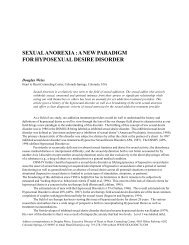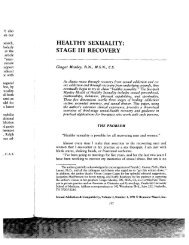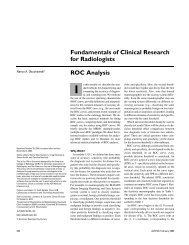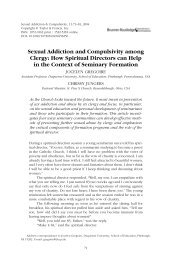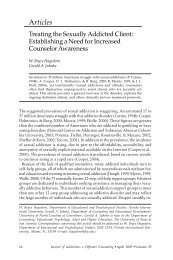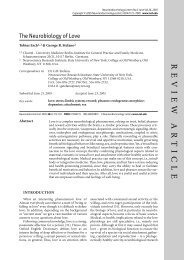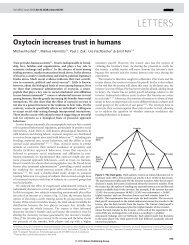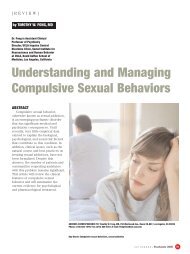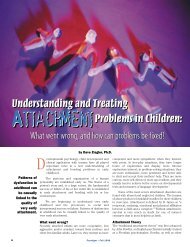An Overview of Psychiatric Ethics
An Overview of Psychiatric Ethics
An Overview of Psychiatric Ethics
Create successful ePaper yourself
Turn your PDF publications into a flip-book with our unique Google optimized e-Paper software.
Applied <strong>Psychiatric</strong> <strong>Ethics</strong>3occurs as a result <strong>of</strong> an unconscious drive to seek punishment or humiliation. These are vulnerabletherapists, usually male, who typically encounter disappointments and setbacks in life. They have<strong>of</strong>ten stagnated and lost a sense <strong>of</strong> meaning. In such a state they are susceptible to misinterprettransference and countertransference for true love.Psychotherapy and Values<strong>An</strong>other area <strong>of</strong> interest in this stream <strong>of</strong> psychiatric ethics has been the implications <strong>of</strong>psychotherapy for the autonomy <strong>of</strong> patients, particularly in regard to the imposition <strong>of</strong> the values<strong>of</strong> the therapist on the patient. It has been argued that in creating the “talking cure” Freud hadattempted to convert moral discourse into a scientific one. 287 Psychotherapy has been describedas a masked form <strong>of</strong> moral discourse, with allusions to a quasi-religious conception <strong>of</strong> the good 288“veering” – as Hinshelwood argued – “between being a scientific and a moral activity (p.195)”. 289Indeed psychotherapy has been conceptualised as the integration <strong>of</strong> a nonreligious but spiritualview in the pursuit <strong>of</strong> empathic understanding. 290 Psychotherapy <strong>of</strong>ten works best when the valuesystems <strong>of</strong> both patient and therapist approximate each other, but not necessarily converge. 288Jeremy Holmes argued, “Psychotherapy reflects and transmits the values <strong>of</strong> the prevailing culture”and “makes its own unique contribution to cultural and ethical development within our pluralisticsocieties” – through its advocacy for the inner world and self-reflection. 291 By liberating from disease,psychotherapy can be considered as enabling patients to become moral agents 292 and enhancingautonomy by encouraging self knowledge. 293 This process involves the outgrowing <strong>of</strong> infantilenarcissism and imparts values operating at an unconscious level. This necessitates an injunctionfor therapists to deliberate on how their own values affect their work. 29145Psychotherapy and Distributive JusticeThe other main theme in the psychotherapy ethics literature considers the impact <strong>of</strong> market forceson the practice <strong>of</strong> psychotherapy. As Holmes asked “is it ethically correct to prescribe the mostcost-effective (psychotherapies), thereby freeing resources for other potential beneficiaries?”(p.227). Chod<strong>of</strong>f examined the effect <strong>of</strong> the intrusion <strong>of</strong> third party payers into the patient therapistrelationship, particularly in regard to the dilemmas created by issues such as breaches <strong>of</strong>confidentiality and control <strong>of</strong> the provision <strong>of</strong> treatment. 294<strong>Ethics</strong> and Child and Adolescent (C&A) PsychiatryThe Concept <strong>of</strong> ChildhoodChildhood and adolescence are not biologically determined states. Whilst the concept <strong>of</strong>development is a biological entity, the status <strong>of</strong> child or adolescent is a social construct. Green andBloch refer to childhood as a “social construction” with a “brief history” 295 in that previous societieshad little concern with child labour or the sexual exploitation <strong>of</strong> children. The capacity <strong>of</strong> children andadolescents to partake in rational self-governance is both dimensional and highly individual. As such,the conceptualization <strong>of</strong> childhood and adolescence within the context <strong>of</strong> psychiatric ethics relatesprimarily to the differentiation between children and adolescents and autonomous, self-legislatingadults.Autonomy and ChildhoodAutonomy is time and task specific. The capacity for a child <strong>of</strong> 8 to consent to treatment is clearlydifferent from that <strong>of</strong> a child <strong>of</strong> 15. Regardless, in the eyes <strong>of</strong> the law and the tenets <strong>of</strong> best practice,neither patient can consent to treatment without a parent or guardian. A child’s capacity to makeautonomous decisions about their health develops with their cognitive and emotional development,thus evolving into increased future autonomy, 296 this is significant for clinical decision making. 297 Likeautonomy in other settings, it is not a categorical process. As a consequence some <strong>of</strong> the literaturein child psychiatry has considered the viability <strong>of</strong> the construct <strong>of</strong> informed consent in childhood,and in particular how decisions made by parents or guardians on behalf <strong>of</strong> the child should reflectthe wishes <strong>of</strong> the child. 298,299 In this setting, the role <strong>of</strong> psychiatrist is one <strong>of</strong> juggling the complexrelationship between a child’s confidentiality, their capacity for consent, and their responsibility toadvocate for the child’s interests. 300 Indeed, the therapeutic relationship in child psychiatry is uniquein that it frequently casts the therapist in the role <strong>of</strong> de facto parent or authority figure. 301IMET AN OVERVIEW OF PSYCHIATRIC ETHICS



